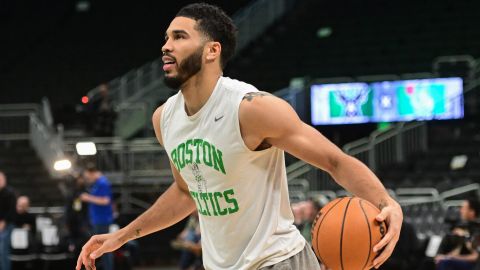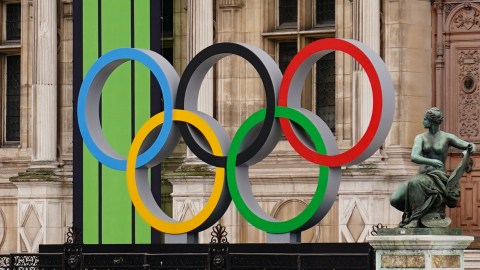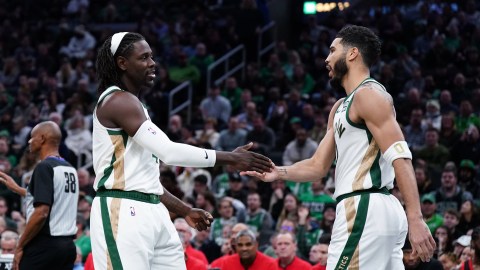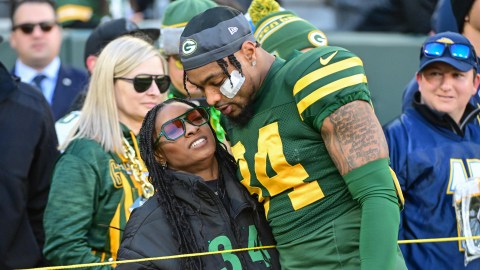 The playoff bracket is set, and the chase for the gold medal in men’s hockey at the 2014 Winter Olympics is almost here.
The playoff bracket is set, and the chase for the gold medal in men’s hockey at the 2014 Winter Olympics is almost here.
After watching the preliminary round, it’s clear that five or six teams are capable of reaching the medal stand in Sochi, making for one of the deepest fields in recent Olympic memory.
Check out the predictions from NESN.com NHL/Boston Bruins editor Mike Cole and assistant editors Nicholas Goss and Zack Cox below. But before that, look at the bracket for the playoff rounds (as well as the TV schedule), courtesy of The Globe and Mail’s James Mirtle.

Bronze Medal
Nick Goss — Switzerland
This is a bold pick, but assuming the Swiss defeat Latvia (which they did in the preliminary round opener), a matchup with Canada wouldn’t be a daunting task. Switzerland has played Canada tough in previous Olympics, including a 2-0 win at the 2006 Turin Games and a shootout loss four years ago in Vancouver.
Switzerland’s current roster is the best it has produced, and starting goalie Jonas Hiller is the MVP of the tournament so far with zero goals allowed (47 saves on 47 shots) in two games. Canada has a ton of offensive firepower, but so do Sweden and the Czech Republic, and the Swiss allowed one total goal to those two teams in the preliminary round. Several of Canada’s top forwards, including team captain Sidney Crosby (zero goals, two assists), are struggling. Canada faced a top-tier goalie in Tuukka Rask on Sunday and scored just two goals in its lowest offensive output of the Olympics.
A bronze medal game matchup with Finland is a likely scenario for the Swiss, who don’t have the scoring depth to keep pace with the Americans and score on goaltender Jonathan Quick in the semifinals. The Finns struggled in their first real test of the Olympics, Sunday’s 2-1 defeat to Canada. Making matters worse for Finland is the Olympics-ending injury to top line center Aleksander Barkov (the Finns already lost their two best centers before Sochi). Hiller and Switzerland’s airtight defense will defeat Finland to capture the bronze.
Mike Cole — Canada
The unfortunate thing for Canada is that its biggest obstacle to winning another gold medal is facing the Americans in the semifinals. Assuming Team USA gets through Canada (more on that below), the Canadians would wind up in the bronze medal game against Finland (again, more on that below). That would set up a rematch of the final game of preliminary round play, in which Canada outlasted Finland in overtime.
The Canadians should be able to learn from that first meeting. The Finns made life difficult Sunday with their smothering and physical style of play, but if Canada can get just a few power plays in the next game, it should be able to cash in. The Canadians have too many weapons for the Finns to keep up with, despite Tuukka Rask’s best efforts in net.
Zack Cox — Canada
Hopes of a gold medal game rematch between Canada and the United States were dashed when the Canadians knocked off Finland in overtime Sunday, but the impending semifinal matchup between the rivals — assuming neither is upset in the quarters — has all the makings of a classic. Only one can earn a spot in the final, though, and I’m giving the edge to the U.S.
One wild card, though, is Sidney Crosby. The best player in the world hasn’t done a whole lot in these Olympics. If Crosby gets hot in the medal rounds, he could easily carry Canada to another gold.
Silver Medal
Nick Goss — Sweden
The Swedes will easily advance to the semifinals because they have too much offensive firepower for a Slovenia team that’s scored just six goals in three games, and their blue line has the speed required to shut down skilled Austrian forwards Michael Grabner (who has an Olympics-leading five goals) and Thomas Vanek.
A final four matchup with Finland is a favorable one for Sweden. The Finns are without their top three centers because of injuries, which would make it difficult to score against a group of Swedish defensemen that includes Oliver Ekman-Larsson, Niklas Kronwall and Erik Karlsson. Finland scored one goal (a deflection) against the only quality goaltender (Canada’s Carey Price) it faced in the preliminary round. The presence of Henrik Lundqvist — arguably the world’s best goaltender — gives Sweden a tremendous chance to reach the gold medal game.
Mike Cole — Sweden
There’s been plenty of talk about the Americans, Canadians and Russians so far in this tournament. That has allowed No. 1 seed Sweden to kind of fly under the radar. The Swedes ran through Group C with only defensive-minded Switzerland giving them much trouble. Sweden has some solid depth up front, with plenty of forwards who are really familiar with the larger ice and international play. The team also can get offense from the back end, as Erik Karlsson is having one of the best tournaments (five points in three preliminary round games). The loss of Henrik Zetterberg to injury, however, certainly does hurt.
The fact that Sweden was able to get that top seed — thanks to Canada needing overtime to beat Finland — is huge. It sets up the Swedes for likely a cakewalk in the quarterfinals, and they would seem to have too much firepower for Finland to handle. Things will get very interesting, however, once the Swedes have to run into a North American club, presumably in the gold medal game. Sweden also has Henrik Lundqvist in net, which means it has as good a chance as any to take home gold.
Zack Cox — Russia
The Russians were not particularly impressive in the preliminary round, needing a shootout to defeat winless Slovakia after falling to the U.S. and being tested in a win over Slovenia. They might be the most talented offensive team in the tournament when they play to their potential, though, and I expect them to do that in the knockout stage. Russia should easily get by Norway, and I can see Alex Ovechkin, Pavel Datsyuk & Co. overwhelming the Finns in the quarterfinals, even with Tuukka Rask having seemingly returned to form after a rough opening game.
That likely would set up a semifinal date with Sweden, which earned the top seed by virtue of playing in the worst of the three pools. Even with Henrik Lundqvist in net, the banged-up Swedes won’t have the horses to keep up with Russia’s elite forwards.
Gold Medal
Nick Goss — United States
The U.S. is the most complete team in the tournament and has several forwards — including Patrick Kane, Phil Kessel, Joe Pavelski and Zach Parise — capable of offensive dominance. The Americans’ biggest strength is their versatility. They’re able to excel in a defensive-minded, low-scoring game or a fast-paced, high-scoring affair. The U.S. also has an elite goaltender in Jonathan Quick, who has been phenomenal in Sochi (2-0, 1.44 goals against average, .944 save percentage). Quick is a Stanley Cup champion and has an impressive NHL playoff resume, so he’s used to stepping up in short tournaments. The group of defensemen in front of Quick provide the perfect blend of defensive skill and playmaking ability, including a shutdown pairing of Ryan Suter and Ryan McDonagh.
The Americans had too much depth for low-scoring Czech Republic and Slovakia in the quarterfinals, and even though a semifinal meeting with Canada or Switzerland would be difficult, the U.S. would be favored against either opponent. A gold medal matchup with Sweden essentially would be a pick-em, but Team USA would have a slight edge because of its scoring depth and physical style of play.
Mike Cole — United States
It probably comes off as a bit of a homer pick, but whatever. The U.S. path to the gold medal game is difficult, as it will have to go through Canada in the semifinals. The American depth up front has been impressive, and that might be just enough to get by what has been a stingy Canadian team. Even if Canada is able to slow the American forwards, the Team USA defensive corps has shown the ability to jump into the play and make things happen offensively. Also, where Dan Bylsma and the Americans seem to have found consistency with their lines and pairings, Mike Babcock and the Canadians are still trying to figure out what works best.
The gold medal game will be a coin flip. The Americans most likely must go through a team with top-notch goaltending, whether it’s Sweden or Finland coming out of the top half of the bracket. The good news for the Americans is they have a pretty good goaltending duo as well, and they should pair that with their important depth just in time to make a deep run and finish the job, which is what they came oh so close to doing in 2010.
Zack Cox — United States
As long as Jonathan Quick plays like he has thus far, this will be the year the U.S. finally breaks its gold medal drought. The Americans’ toughest test would be a matchup with Canada in the semifinals, and while the defending gold medalists certainly have the firepower up front and on the blue line, they lack a steady presence in net (Carey Price allowed only one goal against Finland, but he faced just 15 shots.) The stud U.S. line of James van Riemsdyk, Joe Pavelski and Phil Kessel (who recorded a hat trick against Slovenia on Sunday) is looking like the best in the tournament and should be able to take advantage.
I see a U.S.-Russia rematch for the gold medal, with the visitors again coming out on top in a low-scoring game.



